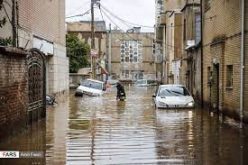Al-monitor -It was just after sunrise on April 7 when the news of an American missile attack on Syria reached Tehran. At first, information about what precisely transpired was limited, yet the attack was received in the Iranian capital as a message from Washington to all parties fighting along the forces of Syria’s defiant President Bashar al-Assad that the grace period given to all involved in the war-torn country by the United States had come to an end. In fact, the Syrian crisis seemed for a few months to have had some rules of engagement when it comes to major incidents like the one that occurred at the Shayrat air base near Palmyra, but this time the whole scene was a shock, given US President Donald Trump’s previous statements with regard to Syria and the region in general. As such, those in Tehran who spoke to Al-Monitor see the missile attack as closer to political maneuvering than a complete change in strategy.
AUTHOR Ali Hashem
“The American attack — though a military action — was a political move,” a military source in the Syria allies joint command center — which brings together Russia, Iran and Hezbollah — told Al-Monitor on condition of anonymity. He said, “The US military informed the Russians before the strike. This gave them the chance to alert the Syrians, so both sides were able to evacuate the base before the attack. It was clear that there was no intention to kill but to send a message to the Russians.”
Moscow was highly intimidated by the strike, mainly given that it was aiming to forge strategic cooperation with Washington to secure a solution to the six-year crisis. Once again, Russia was left with no serious partner in Syria but Iran, since the latest action by the United States was seen as hostile by Moscow, and the swinging strategy adopted by Turkey, which seems to be leaning toward Washington after the strike. On April 9, Russian, Syrian and Iranian officials held high-level consultations over the phone. Iranian President Hassan Rouhani called his Syrian counterpart, while Russian President Vladimir Putin called Rouhani. Meanwhile, the Russian and Iranian defense ministers spoke over the phone too, while Iranian national security adviser Ali Shamkhani and his Syrian counterpart, Ali Mamlouk, agreed to coordinate actions during a phone conversation.
In Syria, military commanders met and issued a harsh statement vowing to “respond with force to any aggressor or any breach of red lines from whoever — and America knows our ability to respond well.” The joint command center stressed that the presence of US troops in northern Syria was “illegal,” and that Washington had a long-term plan to occupy the area, saying that they will not allow a unipolar world with the United States as the dominant power to continue to impose its will across the globe.
“The Iranians are convinced that the United States knew the chemical attack had nothing to do with the Syrian government or the armed forces,” Tehran University professor Mohammad Marandi told Al-Monitor. “That is why they didn’t want an impartial inquiry and so they attacked the Syrian air force base without fear of chemicals leaking.” He added, “Trump is under enormous pressure at home because of his many setbacks and a hostile media. Therefore, he carried out this attack because this makes both the [US] establishment and the media content and it distracts attention away from his problems.”
Marandi explained that Trump would have liked to gain leverage, but that he instead antagonized the Russians, thus strengthening their determination. He said, “President Putin cannot afford to be humiliated by the United States after all that his government has done in Syria. So in my opinion, it [the missile attack] was good for Trump and bad for the United States.”
In the immediate aftermath of the US attack, Iran condemned it — yet the condemnations were not up to the level of what had happened. An Iranian official who asked not to be identified told Al-Monitor, “The message was meant for the Russians, and it was the Russians who had connections and coordinations with Washington. So Tehran will surely condemn [the US attack], but it is not Tehran that is going to respond on behalf of Moscow. When the Russians had their say, we backed them, and we will back them as close allies.”
The official added, “Our point of view from the beginning was that it is not wise to build on Trump’s policies; we believe the US president does not have a clear plan, and this strike is indicative of this. We are quite sure that he was pushed to approve [the strike] by his military and security advisers, as they are the ones working in Washington right now on getting their country involved directly in the Syrian crisis. They have been doing this quietly in the north of Syria, and here the US president is just a facilitator. Does he know that following the attack on the [Shayrat] air base, [Islamic State] terrorists took advantage of the strike and attacked nearby oil fields?”
Despite the anger in Tehran over the US attack, the Iranians have emerged as the main winners of the latest turn in the Syrian crisis. Once again, Russia has no trusted partner in Syria but Iran, and Tehran is now able to push Moscow to adopt a stronger stance against the US role in the Syrian crisis, meaning that mainly from the Iranian point of view, if such strikes are left without a strong response — even if verbal — they will become a daily or weekly occurrence.
 Shabtabnews In this dark night, I have lost my way – Arise from a corner, oh you the star of guidance.
Shabtabnews In this dark night, I have lost my way – Arise from a corner, oh you the star of guidance.



